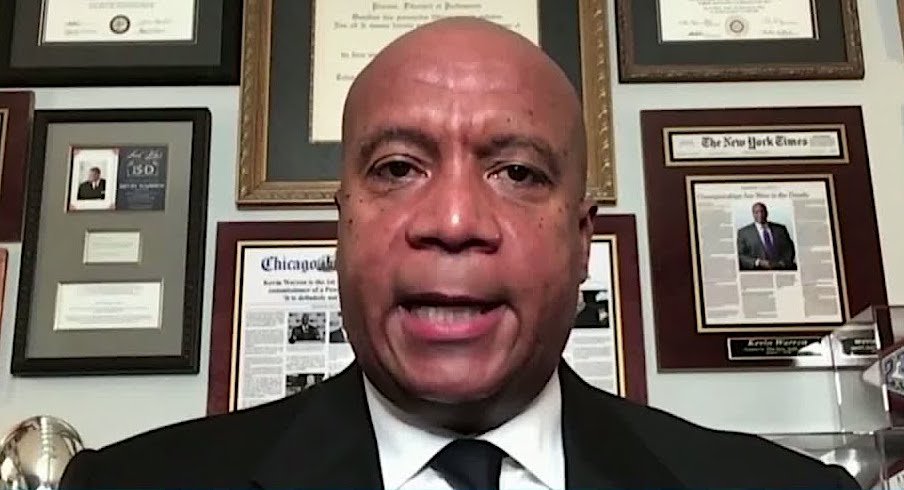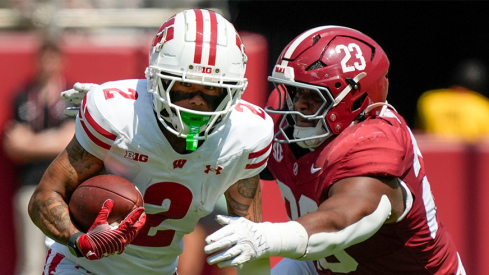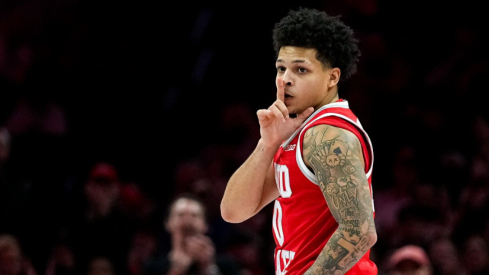In his interview with Big Ten Network just shortly after Tuesday’s announcement that the Big Ten would not play fall sports this year, Kevin Warren didn’t want to directly answer most of the questions that came his way.
Was the vote to postpone fall sports unanimous among Big Ten presidents and chancellors? Warren said he “would rather not have a detailed discussion” about that, instead saying simply: “This is a decision that was made on a collective basis, and I just want to just express to you that we will continually do everything we possibly can at every level in the Big Ten to make sure that our student-athletes are respected and encouraged.”
What would happen if a Big Ten school attempted to play a football season outside of the conference structure? Warren said Tuesday wasn’t the appropriate day to address that – though he did later tell Yahoo Sports’ Pete Thamel that a school could not do that, after Nebraska threatened to do just that, and continue to be a member of the Big Ten – instead saying he “would just like to focus on our announcement and doing the things that we need to do and should do and should be focusing on.”
What, exactly, made the Big Ten decide that Tuesday was the time to pull the plug on fall sports, just six days after the conference released an updated 10-game conference schedule? Warren didn’t give a straightforward answer on that, either, though he said the Big Ten always viewed it as a “day-to-day situation” and that ultimately, his stance as conference commissioner that it would not be safe to play this fall was rooted in there still being “too much uncertainty” about the COVID-19 pandemic.
“I promise that all the decisions that we will make during my tenure here at the Big Ten will always put the mental and physical health and safety and wellness of our student-athletes at the center,” Warren said. “And when you look at this decision, we just believe collectively there’s too much uncertainty at this point in time and in our country to really encourage our student-athletes to participate in fall sports.”
That answer probably won’t satisfy the Big Ten football players and coaches who desperately wanted to play this season – like those at Ohio State who have been adamant the university was doing what it needed to do to keep them safe – or fans of conference teams who see the ACC, Big 12 and SEC still trying to forge forward with a football season. But after the Big Ten had already decided not to proceed forward with padded football practices, Warren – and at least the majority of the conference’s presidents and chancellors who voted against playing this fall – said they felt now was the point they couldn’t go any further.
“It’s one thing to make plans and then it’s another thing really to put those things into place and to start seeing what’s happening and hearing what’s happening from a practice standpoint on a lot of the issues as far as social distancing and contact tracing and testing, there are just a lot of issues not only in the Big Ten but in society, that we’re trying to get answers to,” Warren said. “And it’s one thing to try to get answers in certain areas of your life, but then when there’s certain other areas, especially when it comes to your health and safety, that a lot of the questions that we need to make sure that we have answered, now that we’re getting closer to really going to the next phase of practice and getting closer to actually compete, to have competition, is that there are just too many uncertainties to feel comfortable from a medical standpoint.”
One factor tied to the Big Ten’s decision to cancel fall sports has been concerns about myocarditis, inflammation of the heart muscle, which has been linked to COVID-19 and reportedly has been detected in at least 10 Big Ten athletes, according to The Athletic’s Nicole Auerbach. Warren said Tuesday, however, that was just one factor – not the primary factor – in the conference’s decision not to play this fall, though he did not give a direct answer when asked whether the Big Ten would share the medical information that ultimately prompted its postponement, as the Pac-12 did.
“All of those items from a medical standpoint, you have to consider,” Warren said. “I know there’s been a lot of discussion about that. But overall, when it comes down to it, it’s just the litany of things that created this state of uncertainty that we need more clarity on from a health and wellness and medical standpoint.”
Warren said he recognized that many people are upset with the decision that was made on Tuesday, but he stands by it because he felt it was the responsible decision that the conference had to make to protect its student-athletes’ health.
“I know many people may not agree with the decision that we’ve made today, and I understand that,” Warren said. “I understand the passion associated with it. But we have a responsibility, as a conference, to make sure that we’re doing everything that we possibly can to keep our student-athletes in an environment where one, they can get a world-class education, earn a world-class degree, and also compete athletically in a safe and healthy environment.”
“I promise that all the decisions that we will make during my tenure here at the Big Ten will always put the mental and physical health and safety and wellness of our student-athletes at the center.”– Big Ten commissioner Kevin Warren
In the days leading up to Tuesday’s decision, it became clear that there was strong disagreement between university leaders, athletic directors and football coaches around the conference about how the Big Ten should proceed forward, and Warren – still in just his first year as commissioner – could now have a difficult job in front of him to repair the discord within his conference and get everyone on the same page as they now move toward playing football and other fall sports in the spring.
Warren still believes, though, that the conference remains strong, and that the Big Ten will ultimately grow and become stronger from the challenges it has had to work through this year.
“I’m confident when we turn around at some point in time in the future and look back over 2020, it will be a time that collectively as a country but in the Big Ten, that we really came together, we learned a lot about ourselves, we’re gonna remain positive and we will continually be an absolutely dominant conference, not only academically but athletically, and make a difference in the world,” Warren said.


